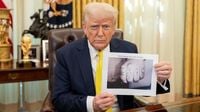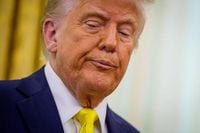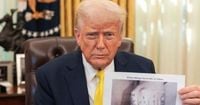In a dramatic turn of events, former President Donald Trump ignited a firestorm of controversy this week after sharing a digitally altered image of Kilmar Abrego Garcia's knuckle tattoos, claiming they provide evidence that the deported El Salvadorian is a member of the notorious MS-13 gang. The image, which Trump posted on his social media platform Truth Social on April 18, 2025, included labels that many criticized as a questionable interpretation of the symbols on Garcia's hand.
Trump's theatrical presentation of the image was intended to bolster his argument against Garcia's return to the United States, a move that has been mandated by U.S. courts. "This is the hand of the man that the Democrats feel should be brought back to the United States, because he is such 'a fine and innocent person.' They said he is not a member of MS-13, even though he's got MS-13 tattooed onto his knuckles," Trump declared, echoing a narrative that has become a central theme in his ongoing immigration rhetoric.
However, the fallout from Trump's post was swift. Online investigators quickly uncovered recent images of Garcia's hand that did not feature the letters 'M,' 'S,' '1,' and '3' that Trump had prominently displayed. Critics, including former Minnesota state senator Linda Higgins, were quick to point out the apparent flaws in the photo, with Higgins tweeting, "Hey Old Man, @realDonaldTrump, have someone teach you about Photoshop. This is an excellent example of altering a photo, in this case to make your illegal actions look good. But instead you look foolish." This sentiment was echoed across social media, where users dissected the image, suggesting it was an amateur Photoshop job.
The labels in Trump's image—'Marijuana,' 'Smiley,' 'Cross,' and 'Skull'—were not only computer-generated but also aligned vertically, raising further questions about the authenticity of the claims being made. An ICE source speaking to The New York Post noted that while Garcia would need an identifying tattoo to be part of MS-13, they had "never heard of those resemblances being made." This contradiction has left many wondering about the validity of the administration's assertions regarding Garcia's alleged gang affiliation.
Garcia's case has been further complicated by the fact that he was deported to El Salvador on March 15, 2025, due to what the Trump administration has admitted was an "administrative error." Despite this, the administration has continued to assert that Garcia is a member of MS-13, a claim that has been challenged in court. Judges have ruled against the Trump administration's handling of the case and have ordered Garcia's return to the U.S., where he had been living for 14 years with his wife and young children.
In a statement, Garcia's wife, Jennifer Vasquez Sura, who married him in 2019 while he was detained over immigration matters, expressed her support for her husband. She noted that they had worked through their issues and that she does not believe a protective order filed against him should prevent his return. "I do not believe the order should prevent him from coming home," she stated.
The controversy surrounding Garcia's tattoos has also drawn attention to the broader implications of gang affiliation in the immigration debate. MS-13, or Mara Salvatrucha, is a violent gang that originated among Salvadoran immigrants in the United States. Tattoos associated with the gang often signify allegiance and rank, and they can be intimidating symbols of gang culture. However, experts have pointed out that tattoos alone do not necessarily indicate gang membership, and many individuals may wear similar symbols without any gang affiliation.
In the wake of Trump's post, Democratic Maryland Senator Chris Van Hollen met with Garcia in El Salvador and called for his release. "Following his abduction and unlawful deportation, U.S. federal courts have ordered the safe return of my constituent Kilmar Abrego Garcia to the United States," Van Hollen said. He emphasized the urgency of the situation, stating that it should be a priority for the U.S. government to secure Garcia's safe return.
As the debate continues, critics have raised concerns about the Trump administration's approach to immigration and the treatment of individuals like Garcia. The administration's insistence on portraying him as a gang member despite conflicting evidence has led to accusations of flouting due process. J. Harvie Wilkinson, a 4th Circuit appeals court judge, remarked that while the government asserts that Garcia is a terrorist and a member of MS-13, he is still entitled to due process.
In the midst of this controversy, the Trump administration's narrative has faced significant pushback. Critics have pointed out that the image shared by Trump fails to provide conclusive evidence of Garcia's alleged gang affiliation. In fact, the symbols on Garcia's hand—depicting a marijuana leaf, a smiley face, a cross, and a skull—have not been definitively linked to MS-13 in law enforcement guidelines.
As the situation develops, the question remains: will the Trump administration heed the calls for Garcia's return and acknowledge the complexities surrounding his case? The ongoing fallout from Trump's claims serves as a reminder of the contentious nature of immigration policy in the United States and the human lives affected by it.



